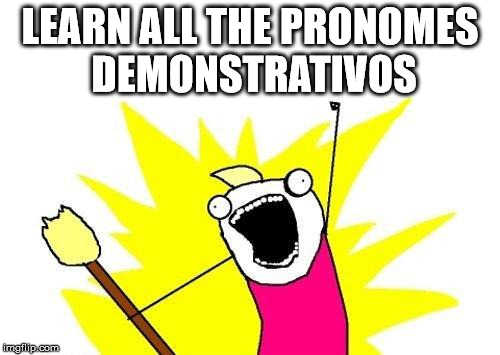Demonstrative pronouns em Português Posted by Ester on Aug 3, 2015 in Grammar, Learning
Oi gente. You may have already learned the pronomes demonstrativos, but it’s worth having another look, especially with the combinations below:
- Isso, esse, este, essa, esta (all meaning “this” or “these”) are used when you are referring to something which is close to you.
- Esse, este – this (masculine)
Always followed by a masculine noun. Esse is informal and este is formal.
Exemplo: Maria não assistiu esse filme com a gente. – Maria didn’t watch this film with us.
- Esses/estes – these (masculine)
Always followed by a masculine plural noun. Esses is informal and estes is formal.
Exemplo: Maria não assistiu esses filmes com a gente. – Maria didn’t watch these films with us.
- Essa, esta – this (feminine)
Always followed by a feminine noun. Essa is informal and esta is formal.
Exemplo: Carlos usou esta camisa para ir à reunião – Carlos wore this shirt to go to the meeting.
- Essas, estas – these (feminine)
Always followed by a feminine plural noun. Essa is informal and esta is formal.
Exemplo: Carlos usou estas camisas para ir às reuniões – Carlos wore these shirts to go to the meetings.
- Isso, Isto – this
NOT followed by a noun, so there is no feminine, masculine or plural. Isso is informal and isto is formal.
Exemplo: Eu não posso comer isso, sou alérgico. – I can’t eat this, I’m allergic.
Personal observation: even though the isto, esta, este forms are supposed to be used in formal situations, few people actually really use them. So learning the informal might be more useful.
- Aquilo, aquele, aquela, aqueles, aquelas (all meaning “that” or “those”) are used when you are referring to something which is distant from you.
- Aquele – that (masculine)
Always followed by a masculine single noun.
Exemplo: Aquele rapaz é meu colega de sala. – That guy is my classmate.
- Aquela – that (feminine)
Always followed by a feminine single noun.
Exemplo: Eu comprei aquela mala que nós vimos ontem. – I bought that suitcase we saw yesterday.
- Aqueles – those (masculine)
Always followed by a masculine plural noun.
Exemplo: Você achou aqueles livros que estava procurando? – Did you find those books you were looking for?
- Aquelas – those (feminine)
Always followed by a feminine plural noun.
Exemplo: Eles cortaram aquelas árvores para construir uma estrada. – They cut down those trees to build a highway.
- Aquilo – that
NOT followed by a noun, so there is no feminine or masculine.
Exemplo: Aquilo é um rio ou um lago? – Is that a river or a lake?
Using the prepositions em or de + one of the pronouns above:
- Em + isso = nisso/Em + isto = nisto
Nós não falamos mais nisso. – We don’t talk about this anymore.
- Em + esse = nesse/Em + este = neste
Eu morei neste prédio anos atrás. – I lived in this building years ago.
- Em + essa = nessa/Em + esta = nesta
André mora nessa cidade. – André lives in this city.
- Em + aquilo = naquilo
Eu estava pensando naquilo que te falei. – I was thinking about the thing I told you about.
- Em + aquele = naquele
Jaqueline foi naquele médico que você sugeriu. – Jaqueline went to that doctor you suggested.
- Em + aquela = naquela
O Gustavo foi naquela festa? – Did Gustavo go to that party?
- Em + aqueles = naqueles
Hugo sempre está naqueles bares da Rua Almirante Alexandrino. – Hugo is always in those bars on Almirante Alexandrino Street.
- Em + aquelas = naquelas
Seu grupo pode sentar-se naquelas cadeiras ali. – Your group can sit down on those chairs over there.
- De + isso = disso/De + isto = disto
Estou muito velho para ter medo disso. – I’m too old to be afraid of this.
- De + esse = desse/De + este = deste
Amanda não gostou desse vestido. – Amanda didn’t like this dress.
- De + essa = dessa/De + esta = desta
Márcia não gosta quando você a trata dessa maneira. – Márcia doesn’t like it when you treat her this way.
- De + aquilo = daquilo
Joana não precisa mais daquilo. – Joana doesn’t need that anymore.
- De + aquele = daquele
Eu me lembro muito bem daquele dia. – I remember that day very well.
- De + aquela = daquela
Eu gosto muito daquela música. – I like that song a lot.
- De + aqueles = daqueles
Victor não entendeu uma palavra daqueles e-mails que você mandou. – Victor didn’t understand a word of those e-mails you sent.
- De + aquelas = daquelas
Acho que nós vamos precisar daquelas assinaturas para continuar o projeto. – I think we will need those signatures to continue with the project.

Build vocabulary, practice pronunciation, and more with Transparent Language Online. Available anytime, anywhere, on any device.





Comments:
Paul:
Good to know more about informal language as it is spoken in Brazil not just the written language